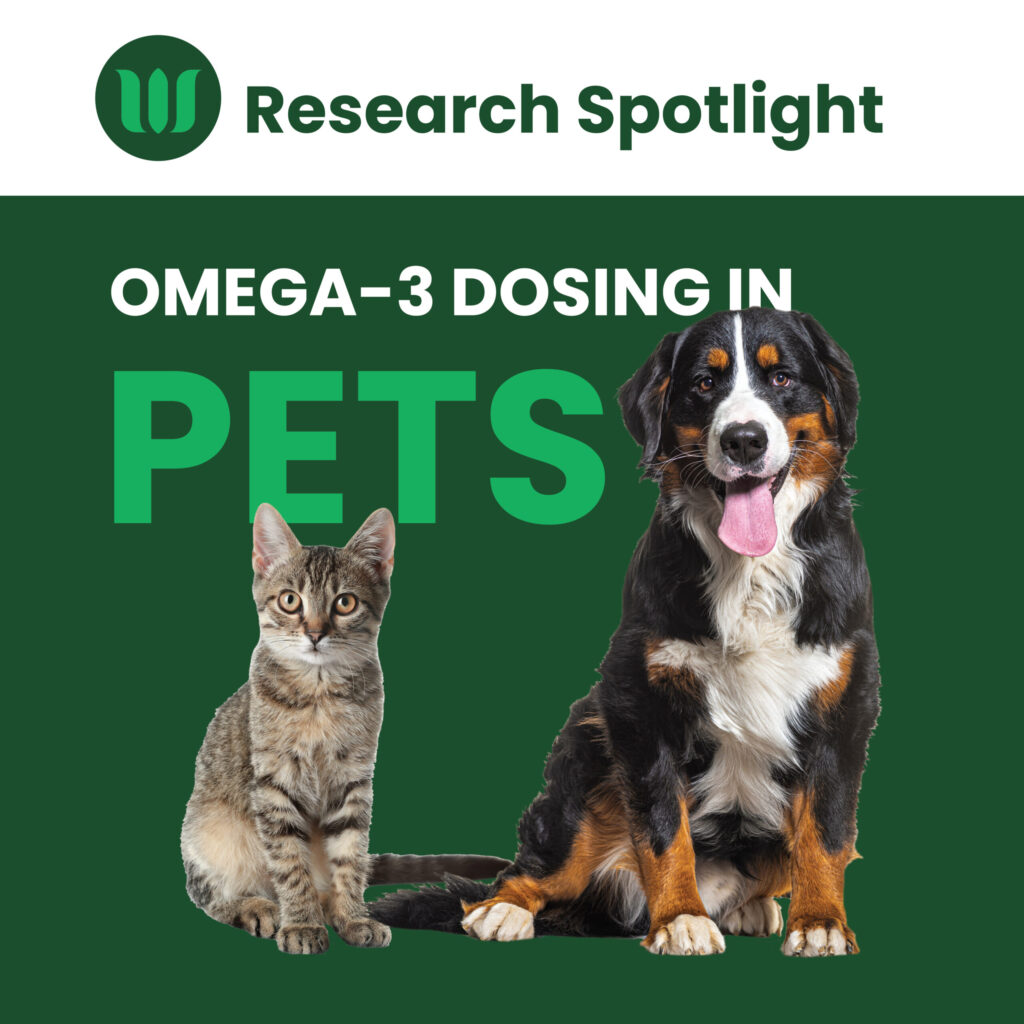Matters of the Heart: Cardiometabolic Support for Pets
Matters of the Heart: Cardiometabolic Support for Pets
There are several steps pet owners can take to ensure optimal heart health for their pets. This includes helping their dogs and cats stay active throughout their lifetime and feeding their animals intentionally with nutritious foods that contain antioxidants, B vitamins, omega-3 fatty acids, and other important nutrients.
What is Cardiometabolic Health?
Cardiometabolic disease is characterized by conditions including diabetes, metabolic syndrome, and cardiovascular disease. Cardiometabolic disease is of increasing concern in humans, and both dogs and cats can also exhibit cardiometabolic disorders. Cardiometabolic health in dogs and cats has been declining in recent decades, and while research is limited in these populations, data from animal studies as well as humans point to potential interventions that may be helpful for pets.
Approximately 10 percent of dogs in the United States have heart disease, although that number varies among breeds.1 The most common forms in dogs include chronic valve heart disease primarily found in small breeds and dilated cardiomyopathy (DCM) which affects large breeds. While heart disease is less common in cats than dogs, cats can develop hypertrophic cardiomyopathy (HCM) which is the most common heart disease in adult cats. As both dogs and cats age, they are prone to heart disease whereas in young animals, these conditions tend to stem primarily from genetics and breed specific conditions.1 With early detection and nutritional support it is possible to improve heart health, extend survival time, and increase quality of life for cats and dogs.
Heart Disease in Dogs
While genetics play a role in the development of DCM for some dogs, many cases result from obesity-related cardiac dysfunction. Approximately 24 to 30 percent of the pet dog population is estimated to be overweight, commonly a result of unintended overfeeding.2 Similar to humans, the presence of excess weight leads to several detrimental outcomes in dogs. Obese dogs have altered cardiac structure and function compared to dogs that are an ideal weight, with abdominal obesity found to be associated with heart disease.2,3 They also demonstrate insulin resistance, dyslipidemia, low levels of the hormone adiponectin which plays an important role in regulating glucose levels and fatty acid breakdown, and increased levels of several inflammatory markers.3,4
Nutritional Support for Dogs
Ensuring an adequate diet as suggested by a veterinarian and avoiding overfeeding is a great place to start. Additionally, there are several nutrients that may be helpful to pay attention to in order to maintain cardiometabolic health in dogs.
Taurine and precursors
One subclass of heart disease in dogs is a result of taurine deficiency, referred to as taurine-deficient DCM. Taurine is a sulfur-containing amino acid that dogs can synthesize from cysteine. Taurine is a non-essential amino acid, but it can become limited or required in higher doses under certain conditions. Taurine is an important biological molecule for several systems including the cardiovascular, musculoskeletal, and central nervous systems.5 Specifically, it increases intracellular concentrations of calcium, which serves as an osmoregulator in the heart and also functions as an antioxidant, helping to mitigate oxidative stress and maintaining cardiac function.5 When diets were supplemented with taurine and L-carnitine, DCM was reversed in dogs and they lived longer.5
Taurine levels may be lower than desired if the dietary supply is less bioavailable or has been degraded during processing. There are also likely breed-specific requirements for taurine such that a target requirement range cannot be applied across all breeds.5 Additionally, amino acids methionine and cysteine are required to synthesize taurine and therefore may be required in higher doses when taurine is low to restore levels back to normal.
Carnitine
Carnitine is another important nutrient for supporting heart health in dogs. It is synthesized in the liver, making liver and other animal-based proteins a good source for dogs. Carnitine is important in energy production for the heart through its role in beta-oxidation of fatty acids. Roughly 60 percent of the total energy production for the heart is through beta-oxidation, making carnitine a vital player in heart metabolism.5 Several studies have found that carnitine deficiency can cause cardiac dysfunction, leading to DCM and other cardiac diseases.5
Selenium and vitamin E
Selenium and vitamin E are important in the antioxidant system. Together, they prevent oxidative damage to fatty acids in plasma, red blood cells, and tissues.5 Furthermore, selenium is an important determinant in the synthesis of taurine.5 If the bioavailability of selenium is limited, it can hinder the absorption of other cofactors involved in synthesizing taurine, further exacerbating cardiac dysfunction.5
Choline and B vitamins
Choline has several functions within the body, including forming part of the neurotransmitter acetylcholine and influencing cellular processes such as lipid metabolism and cellular signaling. For its role in cardiometabolic health, choline is vital in the regeneration of methionine from homocysteine. When choline is deficient, the ability to methylate homocysteine into methionine is limited and plasma homocysteine concentrations rise.5 Hyperhomocysteinemia, or elevated homocysteine levels, are detrimental to heart health. However, it is not clear that supplementation with choline is beneficial in dogs.
The B-vitamins thiamin (B1) and niacin (B3) are also important nutrients in supporting cardiometabolic health in dogs.5 Thiamin is an essential nutrient and plays a significant role in the metabolism of all classes of macronutrients: carbohydrates, lipids, and proteins – specifically branched-chain amino acids. Niacin is important in the synthesis of taurine and carnitine and is therefore required at adequate levels in order to support biosynthesis of these nutrients.5
Other nutrients
Several other nutrients are also important in maintaining heart health in dogs:
- Copper: important for energy metabolism, assists in function of critical enzymes, and maintains strength of cardiovascular system components including blood vessels5
- Zinc: cofactor for the synthesis of taurine and carnitine5
- CoQ10: serves as a powerful antioxidant and supports myocardial function6
- Phytonutrients: have diverse effects as bioactive molecules, including as antioxidants7
- Omega-3 fatty acids: support proper inflammation pathways, cardiovascular health, and several other health conditions8
Role of fiber
Fiber assists in many vital digestion processes including affecting stool quality, increasing satiety, moderating glucose absorption, improving gut health, and contributing to the production of short chain fatty acids which are an important energy source. However, diets high in fiber can decrease the digestibility of protein in the intestines.5 The sulfur-containing amino acids are metabolized primarily in the gastrointestinal (GI) tract, and intestinal metabolism significantly affects the concentration of metabolites in the plasma, including taurine, cysteine, and methionine.5 As such, too much fiber can lead to a decrease in these nutrients and may result in taurine or carnitine deficiency. Fiber also affects digestion and absorption of nutrients in other ways, and the negative aspects should be weighed with the benefits to ensure an optimal dose of fiber.
OMEGA-3 DOSING IN PETS
EPA & DHA for Dogs & Cats
Research highlights the need for including omega-3 fatty acids in the diet of both dogs and cats, as well as the benefits associated with EPA & DHA.

Cardiometabolic Health in Cats
Cats experience a similar prevalence of overweight and obesity as dogs, with the general feline population in the United States ranging from 25 to 40 percent.9 Unfortunately, research that investigates heart disease in cats is more limited than that available for humans and dogs. While there is no method for reversing or fully treating HCM in cats, available research suggests that nutrition is one avenue that may have a significant effect on cardiovascular outcomes.10
Nutritional Support for Cats
Taurine and arginine
Taurine is a non-essential amino acid in dogs, but it is considered essential in cats due to lower activity of the enzyme that converts cysteine to taurine.5 Decreased potassium intake can lead to taurine depletion which contributes to HCM in cats.5 Cats also require arginine, an amino acid that serves as a precursor to nitric oxide, which is required for healthy vasodilation and endothelial health.11
Vitamin D
Studies have produced conflicting data on the role of vitamin D in heart disease in cats. When cats were separated by age, researchers found that levels of the sum of all forms of vitamin D differed between cats with and without heart disease.12 One possible explanation is declining renal function but given the diverse and important functions of vitamin D in humans and dogs, vitamin D may be an important nutrient for maintaining heart health in cats.
B vitamins
Cats require more methionine and vitamin B6 than other species which may position them to have deficiencies due to inadequate intake, excessive loss, or altered metabolism of these nutrients.11 Vitamin B12 was also found to be lower in cats with cardiac disease, and while this does not mean vitamin B12 is necessarily the cause, it may contribute to cardiac health.
Heart disease in dogs and cats remains an understudied condition. However, there are several steps pet owners can take to ensure optimal heart health for their pets. First, it is important that owners help dogs and cats stay physically active throughout their lifetime, as well as remain vigilant regarding meals and treats to avoid unintentional overfeeding. Finally, providing a diet with sufficient levels of taurine, carnitine, antioxidants, B-vitamins, and omega-3 fatty acids can help mitigate the risk of nutrient deficiencies related to heart disease in dogs and cats.
- Atkins, C., Bonagura, J., Ettinger, S., Fox, P., Gordon, S., Haggstrom, J., Hamlin, R., Keene, B., Luis-Fuentes, V., Stepien, R. (2009). Guidelines for the diagnosis and treatment of canine chronic valvular heart disease. J Vet Intern Med, 23(6):1142–1150.
- Thengchaisri, N., Theerapun, W., Kaewmokul, S., Sastravaha, A. (2014). Abdominal obesity is associated with heart disease in dogs. BMC Vet Res, 10:131-137.
- Tropf, M., Nelson, O.L., Lee, P.M., Weng, H.Y. (2017). Cardiac and Metabolic Variables in Obese Dogs. J Vet Intern Med, 31(4):1000-1007.
- Tvarijonaviciute, A., Ceron, J.J., Holden, S.L., Cuthbertson, D.J., Biourge, V., Morris, P.J., German, A.J. (2012). Obesity-related metabolic dysfunction in dogs: a comparison with human metabolic syndrome. BMC Vet Res, 8:147-154.
- McCauley, S.R., Clark, S.D., Quest, B.W., Streeter, R.M., Oxford, E.M. (2020). Review of canine dilated cardiomyopathy in the wake of diet-associated concerns. J Anim Sci, 98(6): 1-20.
- Harker-Murray, A.K., Tajik, A.J., Ishikura, F., Meyer, D., Burnett, J.C., Redfield, M.M. (2000). The role of coenzyme Q10 in the pathophysiology and therapy of experimental congestive heart failure in the dog. J Card Fail, 6(3):233-242.
- Quiñones, M., Miguel, M., Aleixandre, A. (2013). Beneficial effects of polyphenols on cardiovascular disease. Pharmacol Res, 68(1):125-31.
- Freeman, L.M., Rush, J.E., Kehayias, J.J., Ross, J.N., Meydani, S.N., Brown, D.J., Dolnikowski, G.G., Marmor, B.N., White, M.E., Dinarello, C.A., Roubenoff, R. (1998). Nutritional alterations and the effect of fish oil supplementation in dogs with heart failure. J Vet Intern Med, 12(6):440–448.
- Lund, E.M., Armstrong, P.J., Kirk, C.A., Klausner, J.S. (2005). Prevalence and risk factors for obesity in adult cats from private US veterinary practices. Intern J Appl Res Vet Med, 3(2):88–97.
- Freeman, L.M., Rush, J.E., Meurs, K.M., Bulmer, B.J., Cunningham, S.M. (2012). Body size and metabolic differences in Maine Coon cats with and without hypertrophic cardiomyopathy. J Feline Med Surg, 15(2): 74-80.
- McMichael, M.A., Freeman, L.M., Selhub, J., Rozanski, E.A. Brown, D.J., Nadeau, M.R., Rush, J.E. (2000). Plasma homocysteine, B vitamins, and amino acid concentrations in cats with cardiomyopathy and arterial thrombosis. J Vet Intern Med, 14:507-512.
- Ware, W.A., Freeman, L.M., Rush, J.E., Ward, J.L., Makowski, A.J., Zhang, M. (2020). Vitamin D status in cats with cardiomyopathy. J Vet Intern Med, 34:1389-1398.







